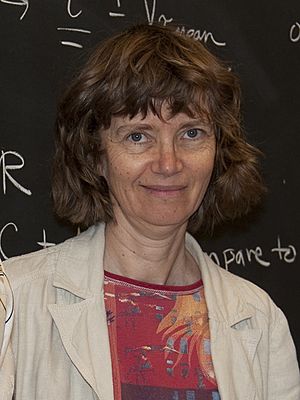Karen Kavanagh facts for kids
Quick facts for kids
Karen Kavanagh
|
|
|---|---|

Kavanagh in 2013
|
|
| Education | Queen's University (BSc) Cornell University (PhD) |
| Scientific career | |
| Institutions | Simon Fraser University |
Karen L. Kavanagh is a talented physicist and professor. She teaches at Simon Fraser University in Burnaby, British Columbia, Canada. Professor Kavanagh leads a special research group called the Kavanagh Lab. This lab studies tiny materials called semiconductors at a very small scale, known as nanoscience.
Contents
Karen Kavanagh's Education Journey
Karen Kavanagh has an impressive background in science.
Early Studies and Research
She earned her first degree, a Bachelor of Science (BSc), in Chemical-Physics. This was in 1978 from Queen's University in Canada. After that, she worked for three years at Bell Northern Research in Ottawa. She was part of their Advanced Technology Laboratory.
Advanced Degrees
Later, she continued her studies at Cornell University in Ithaca, New York. In 1987, she received her PhD. This advanced degree was in materials science and engineering.
Professor Kavanagh's Career
After finishing her studies, Professor Kavanagh worked at important research places.
Postdoctoral Work and University Roles
She did postdoctoral research at IBM and MIT. These are very famous research institutions. After that, she became a professor at the University of California, San Diego. She worked in their Electrical and Computer Engineering Department. Since the year 2000, Professor Kavanagh has been at Simon Fraser University.
Research in Materials Science
Her main area of interest is electronic materials science. This field looks at how tiny flaws or "defects" affect materials. Specifically, she studies semiconductor materials and the devices made from them. Semiconductors are special materials that can conduct electricity under certain conditions. They are used in almost all electronic devices.
Her research has covered many topics. She has studied how stress affects semiconductor structures. She also looked at how to protect silicon and other semiconductor devices. Her work includes how thin layers of materials grow. She also studies how electricity moves through very thin films. Professor Kavanagh uses special tools to study these materials. These tools include electron microscopy and x-ray diffraction.
Recognitions and Publications
Professor Kavanagh is a Fellow of the Institute of Physics. This means she is recognized as an expert in her field. She has written over 200 scientific papers. These papers are published in journals and presented at conferences. In 2022, she was also chosen as a Fellow of the Materials Research Society (MRS). This is another important honor for scientists who study materials.
Awards and Honors
Professor Kavanagh has received several awards for her work:
- Vancouver YWCA Women of Distinction Award (2006)
- NSERC University Faculty Awardee (1999)
- NSF Presidential Young Investigator Award (1991)

